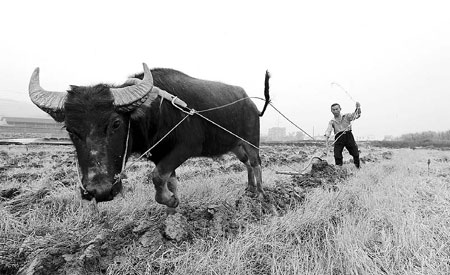Rural development remains a top priority
Updated: 2013-02-01 07:33
By Jin Zhu (China Daily)
|
||||||||
|
A farmer plows a field in Rongan county, the Guangxi Zhuang autonomous region, on Tuesday. Tan Kaixing / for China Daily |
Modernization of agriculture subject of key policy document
Efforts will be intensified to accelerate the country's agricultural modernization and enhance developmental vitality in the sector, a central policy document said.
China will set up a system to ensure the effective supply of important agricultural products, increase farmers' income and improve their livelihoods, as well as push forward reforms in rural areas, according to this year's No 1 document issued by the Central Committee of the Communist Party of China and the State Council on Thursday.
Central authorities regularly release major policy documents at the beginning of each year to address government priorities.
This is the 10th consecutive year that the theme of the first document has been rural issues.
China is facing several challenges in agricultural development, including rising production costs and structural barriers between supply and demand of agricultural products, due to the country's fast industrialization and urbanization, the document said.
The preferential policy will support more professional investors, family farms and rural cooperatives to be engaged in farm production, it said.
China recorded grain output of more than 589 million metric tons in 2012. It was the ninth consecutive year of increased grain harvests, according to the National Bureau of Statistics.
Meanwhile, the country imported 2.32 million tons of rice last year, a 310 percent year-on-year increase and the peak volume since 2000, according to the Ministry of Agriculture.
Imports of soybeans last year reached 58.4 million tons, according to the ministry.
With many farmers moving to cities and industrial sectors, an inadequate labor force is gradually becoming a major factor hindering the country's grain output, analysts said.
The document will help determine who will farm and grow grains for the country in the future, said Lu Bu, a researcher in agricultural resources and regional planning at the Chinese Academy of Agricultural Sciences.
The country's agricultural output will be increased when more professional investors, family farms and rural cooperatives are involved in farm production, he said.
"Farmers will be interested in using more advanced technologies in agricultural production when they are farming on a larger scale," he said.
In 2012, the country had 680,000 rural cooperatives, a 30 percent year-on-year increase, according to the Ministry of Agriculture.
The document also said it will establish a strict access and a supervision system for industrial and commercial enterprises which rent farmers' land for agricultural production.
Government authorities should make clear whether such enterprises are using land in rural areas for agricultural development so that farmland won't be seized for other uses, Chen Xiwen, director of the Office of the CPC Central Committee's Leading Group on Rural Work, said at a forum in January.
jinzhu@chinadaily.com.cn
(China Daily 02/01/2013 page4)

 In Photos: 7.0-magnitude quake hits Sichuan
In Photos: 7.0-magnitude quake hits Sichuan
 Li Na on Time cover, makes influential 100 list
Li Na on Time cover, makes influential 100 list
 FBI releases photos of 2 Boston bombings suspects
FBI releases photos of 2 Boston bombings suspects
 World's wackiest hairstyles
World's wackiest hairstyles
 Sandstorms strike Northwest China
Sandstorms strike Northwest China
 Never-seen photos of Madonna on display
Never-seen photos of Madonna on display
 H7N9 outbreak linked to waterfowl migration
H7N9 outbreak linked to waterfowl migration
 Dozens feared dead in Texas plant blast
Dozens feared dead in Texas plant blast
Most Viewed
Editor's Picks

|

|

|

|

|

|
Today's Top News
Live report: 7.0-magnitude quake hits Sichuan, heavy casualties feared
Boston suspect cornered on boat
Cross-talk artist helps to spread the word
'Green' awareness levels drop in Beijing
Palace Museum spruces up
First couple on Time's list of most influential
H7N9 flu transmission studied
Trading channels 'need to broaden'
US Weekly

|

|









